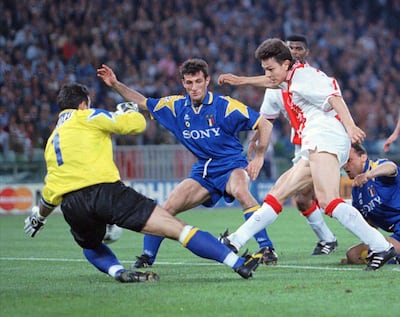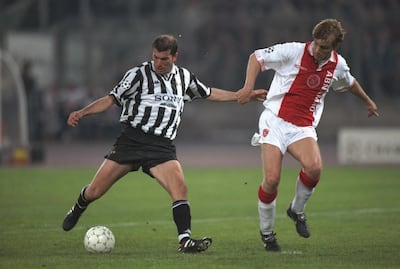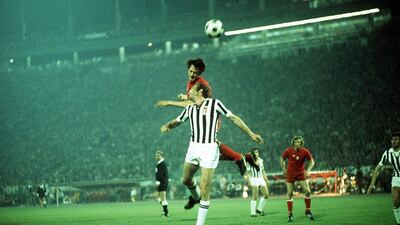So far, they have scored four times against Bayern Munich, and they have defeated Real Madrid. Ajax’s Champions League run has been exhilarating - and evocative, with heavy echoes of the club’s gilded past in the European Cup. Now for Juventus, a duel that resonates as powerfully as any.
Ajax 1-0 Juventus, European Cup final, 1973
Forty-six years ago, just as in 2018/19, Ajax met Bayern and then Real Madrid on the way to a high-stakes collision with Juventus. The difference is that, in the early 1970s, the Dutch champions were not the underdogs, but the lords of Europe. They had won the most prestigious title in the club game in 1971 and 1972, and were being inspired by Johan Cruyff, probably the most admired player in the world.
Cruyff was bound for Barcelona soon after the 1973 final, in which, on a hot, humid night in Belgrade, Ajax provided almost all the flair, the eventual scoreline testifying to Juventus’s more Italian virtues, of order and containment. But they were not enough. Johnny Rep’s header in the fourth minute, the only goal of the game, delivered Ajax’s third successive European Cup.
Juventus 1-1 Ajax (2-2 on aggregate, 3-0 pens), European Cup quarter-final, 1978
Five years after reaching their first final, Juventus were on the up, Ajax turning mortal. The Italians had won the Uefa Cup and their 17th Serie A title in 1977, and were chief suppliers of players to the Italy national team. One of those, goalkeeper Dino Zoff, emerged heroic from an attritional, extended last-eight tie.
Zoff had made a smart save from Ajax’s Tsheu La Ling in the first leg in Amsterdam before Pim Van Dord put Ajax 1-0 ahead in the 86th minute. Franco Causio equalised in the 90th. In Turin, Marco Tardelli gave Juventus an overall lead, La Ling, on as a substitute, replying with 15 minutes to go. So to a goalless extra-time and then to penalties: Zoff made two saves, La Ling missed the target and Juve progressed thanks to their three converted spot kicks.

Juventus 1-1 Ajax (4-2 pens), Champions League final, 1996
The Ajax who had become European champions for the fourth time in the club’s history, in 1995, were exceptionally young. They were also vulnerable, that year’s Bosman ruling transforming the transfer market and making it harder for clubs from less wealthy leagues to retain their best young players.
They still stylishly reached the Rome final, where Juventus took the lead through Fabrizio Ravanelli, the striker capitalising on a moment of confusion between Frank de Boer and Ajax goalkeeper Edwin Van der Sar. Shortly before half time Jari Litmanen equalised. It stayed 1-1 through the next 80 minutes. So to penalties. Once Edgar Davids had seen his spot kick, Ajax’s first, saved by Angelo Peruzzi, the Italians held an advantage and scored with each of their four attempts, becoming European champions after Sonny Silooy’s effort from the spot had been saved.

Juventus 4-1 Ajax (6-2 aggregate), Champions League semi-final, 1997
The 1996 final had been tight. By nine months later, a gulf of class opened up between the two clubs. The departures of Edgar Davids and Nwankwo Kanu to Serie A clubs in the summer of 1996 signalled a procession of young talents away from Amsterdam; Juventus meanwhile, had signed Zinedine Zidane.
In their home leg, Ajax went down 2-1, Jari Litmanen’s goal giving them some hope for the Turin leg, to which Ajax travelled on the back of a three-year run of away games unbeaten in Europe. They started well but fell behind after a Zidane corner was met by Attilio Lombardo; once Zidane set up Nicola Amoruso to score, Juventus were 3-1 up on the night and 5-2 ahead in the tie. Zidane himself made it 4-1 with a soloist strike, to help make Juve firm favourites for that year’s final.
There, Juve would be surprised by Borussia Dortmund. The next year Juve would again lose the final, in Amsterdam, to Real Madrid. Three times since they have finished with silver medals. Ajax may feel distanced by time from European Cup glory; Juventus sometimes just feel jinxed.


